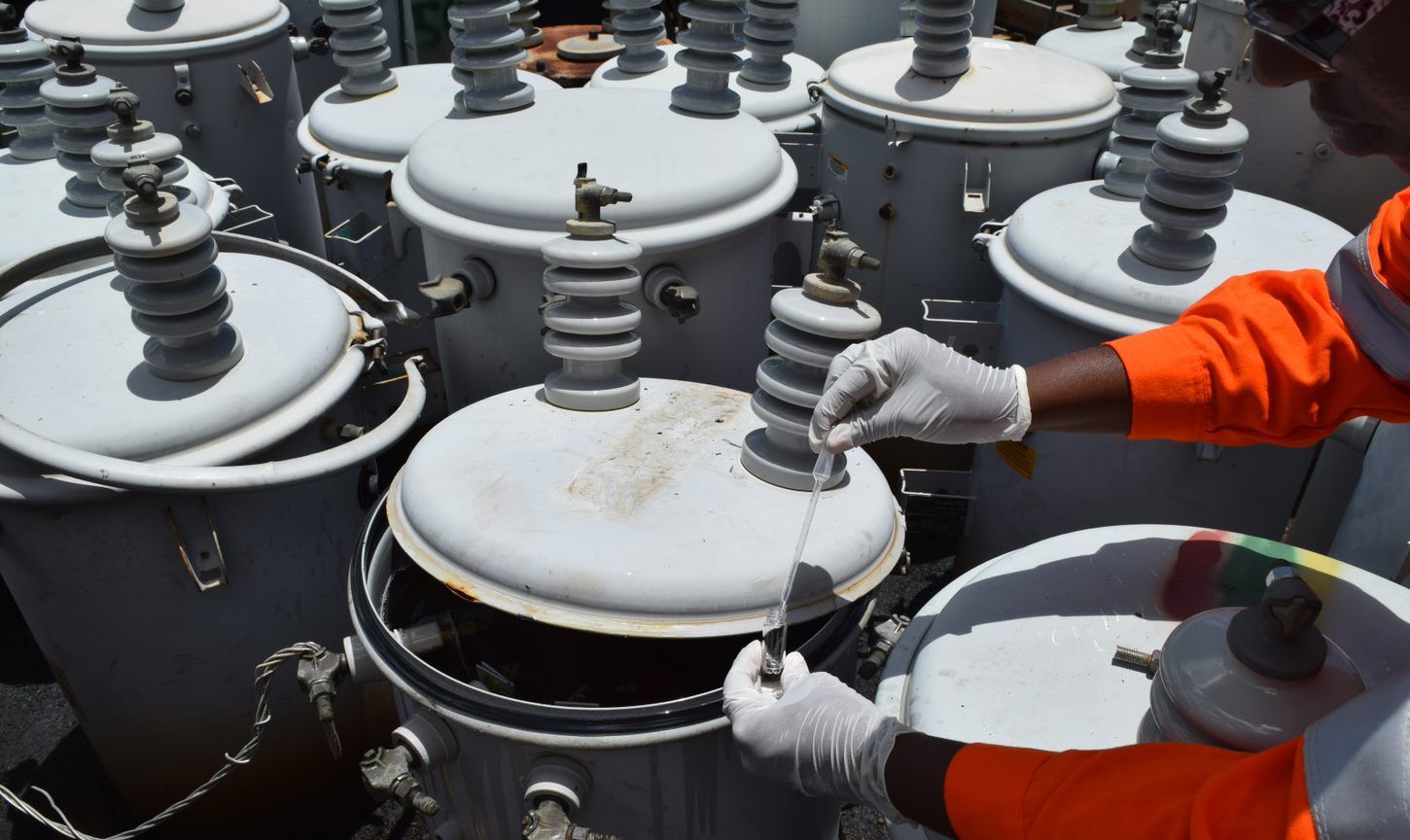Moving the waste and chemicals management agenda forward in the Caribbean
18 December 2018 UNIDO

Persistent Organic Pollutants, known as POPs, are toxic, long-lasting and accumulative chemicals proven to have an adverse effect on human health and the environment across the globe. Exposure to even low levels of these chemicals in food or the air can lead to increased cancer risk, reproductive disorders, alteration of the immune system and increased birth defects.
The most commonly encountered POPs are organochlorine pesticides, such as DDT, industrial chemicals, most notably polychlorinated biphenyls (PCB), as well as unintentional by-products of many industrial processes, such as those commonly known as 'dioxins'.
Several countries of the Caribbean are Parties to the Stockholm Convention on POPs and have pledged to reduce or eliminate their production, use, and/or release. However, very little action has been taken at the national level to implement or comply with the Convention. A lack of resources, weak institutional capacity, and inadequate regulatory frameworks are recognized as some of the contributing factors to the limited POPs management in the region.
“Given our small size, the fragility of our ecosystems and our economies of scale, in the Caribbean region we are particularly vulnerable to the human health and environmental implications associated with poor chemicals and hazardous waste management,” says Jewel Batchasingh, interim Director of the Basel Convention Regional Centre for the Caribbean (BCRC-Caribbean).
A regional project developed by the United Nations Industrial Development Organization (UNIDO) and the Global Environment Facility (GEF) addresses some of these barriers and is helping to achieve sound chemicals management.
“This project is the first of its kind in this part of the world,” explains UNIDO project manager, Alfredo Cueva. “Its regional approach will enable collaboration and resource-sharing between the eight participating countries: Antigua and Barbuda, Barbados, Belize, the Federation of Saint Kitts and Nevis, Saint Lucia, Saint Vincent and the Grenadines, the Republic of Trinidad and Tobago, and the Republic of Suriname.”
Since its inception in December 2015, the project, which is valued at approximately USD 30 million and co-funded by a grant of over 8 million USD from the Global Environment Facility (GEF), has been taking steps to create an enabling environment to reduce and eliminate the threats of POPs in the region. Planned to run until 30 November 2020, the project is implemented by UNIDO and executed by BCRC-Caribbean.
What has the project achieved so far?
“What has been important under this project is the improvement of knowledge for managing chemicals such as POPs,” states Ato Lewis, from Antigua and Barbuda’s Department of Environment. “The key is conducting rapid assessments,” he explains.
To date, five of the eight participating countries have updated their Stockholm Convention National Implementation Plans, and regulatory frameworks to effectively manage chemicals (including POPs) and POPs inventories have been developed in all participating countries. A Regional Manual on the Development of POPs Inventories in the Caribbean has been published, and training on sound chemicals management conducted in eight countries between January and February 2017.
Marcus Natta of the Saint Kitts and Nevis Bureau of Standards describes this support as “timely” for many of the countries, including Saint Kitts and Nevis, which has been a party to the Stockholm Convention since 2004 and has since faced several challenges in meeting its requirements.
Keima Gardiner from Trinidad and Tobago’s Environmental Policy and Planning Division echoed this sense of appreciation. “Under the project we have been able to get tangible outputs, such as the POPs inventory reports and the update of our National Implementation Plan. The project outcomes will undoubtedly support policy development toward the protection of human health and environment against POPs.”
A regional database for chemicals data and information is being developed, as well as communication strategies, training and awareness programmes for POPs and POPs management for the Caribbean.
Through creating national and regional enabling mechanisms, the project aims to contribute to the effective implementation of the Stockholm Convention. This Convention, effective since 2004, aims to protect human health and the environment from POPs, providing a global response to a global problem. Given their long range transport, no one government acting alone can protect its citizens or its environment from POPs.
The project will also reduce unintentionally produced POPs (UPOPs) emissions by improving poor waste management practices at landfills. These practices will be improved in five of the project countries, whilst waste recycling and disposal facilities, including landfills, will be designed for three of the countries, to reduce UPOPs emissions. The anticipated health benefits of this for the local communities are significant.
Two demonstration projects implemented by UNIDO in Belize and Suriname address the reduction of UPOPs. In Belize, a medical waste plan and medical waste regulations have been drafted to help avoid the improper disposal of medical waste. Meanwhile, in Suriname, the closure of the existing landfill in Ornamibo and the development of a sustainable and integrated waste management system have been identified as ways of measurably reducing UPOPs releases. A third demonstration project looks at the development of appropriate remediation strategies for a POPs-contaminated site: the Guanapo landfill in Trinidad and Tobago.
Identifying and remediating contaminated sites is one of the project’s key outcomes, with assessments of potential contaminated sites ongoing in all eight countries. Sites will be prioritized in each country and conceptual site models will be developed for priority sites, based on the assessment and identification of areas of concern.
The establishment of environmentally sound management of polychlorinated biphenyl (PCB) is a further area of focus, with assessments of obsolete stockpiles conducted in several of the countries. Through sampling and analysis, PCB-containing equipment and PCB oil was identified and flagged for disposal in the first quarter of 2019.
“This project not only allows countries to meet their obligations under the Stockholm Convention, but also positions participating countries to move the waste and chemicals management agenda forward for the Caribbean region,” said the BCRC-Caribbean’s Batchasingh.
For further information, please see:
BCRC-Caribbean Website: http://www.bcrc-caribbean.org/
Stockholm Convention website: http://www.pops.int/Home/tabid/2121/Default.aspx
Facebook: https://www.facebook.com/Basel.Convention.Regional.Centre.Caribbean/
Twitter: https://twitter.com/bcrc_caribbean
Instagram: BCRC.CARIBBEAN